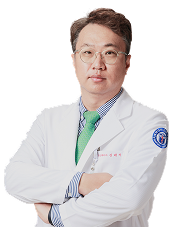
Interview with a professor who won the 2025 Doosan Yonkang Academic Awards – Hepato-biliary-Pancreatic Surgeon’s Division
Kim Tae-Seok, Keimyung University Dongsan Hospital
Q. Once again, congratulations on being selected as the winner of the ‘Doosan Yonkang Academic Awards – Hepato-biliary-Pancreatic Surgeon’s Division’.
A. First, I would like to express my thankfulness to the Chairman of the Korean association of Hepato-Biliary-Pancreatic Surgery (KAHBPS), the President of the Society, and all the other people who selected me to receive this award. In addition, this research was a multi-institutional study, and it was possible because of the help of Professor Koo Jeong Kang, who conducted the research with me, and professors from various centers in Korea. I would also like to express my gratitude to Professor Koo Jeong Kang, who helped me receive this award, and to the professors from many universities who participated in the research. I will understand this award as a message to work harder on my research in the future, and I will strive to conduct more meaningful research in the future.
Q. Among the many fields of medicine, I would like to hear the reason why you chose “Hepato-biliary-Pancreatic Surgery” as your major.
A. After completing my surgical residency, I became interested in the field of organ transplantation and applied for transplant surgery. After training in transplant field, I focused more on liver transplantation, and since many liver transplant patients have liver cancer as the cause, I became interested in liver cancer and related diseases and began to treat and research them. After that, as I specialized in the liver, I naturally began to treat and research biliary tract diseases also, and after that, I specialized in hepatobiliary and pancreatic surgery.
Q. It would be grateful if you are able to explain the field you are working on, and the importance of the research.
A. Currently, I am mainly conducting research on liver cancer, intrahepatic bile duct cancer, and liver transplantation among hepatobiliary and pancreatic diseases. While many medical advancements and drug developments have greatly improved the survival rates of other cancers, cancers of the liver, bile duct, and pancreas have not yet achieved such an improvement in survival rates. Worldwide, the percentage of patients dying from cancer in this field is increasing, so more active research should be conducted in order to improve the survival rates of patients with cancer of the liver, bile duct, and pancreas.
Q. Could you please provide an explanation of the award-winning research paper?
A. Patients with hepatocellular carcinoma (HCC) with portal vein tumor thrombosis (PVTT), who were the subjects of this study, are known to have a very poor prognosis, and guidelines for HCC treatment widely used worldwide recommend non-surgical treatment rather than surgical resection for the treatment of these patients. However, some regions and centers, including those in Asia, are performing surgical treatment, and studies have been published showing that the post-operative prognosis is better than non-surgical treatment. However, not all patients have excellent post-operative results, and some patients are known to show a good prognosis after surgical resection. This study is to investigate the results of surgical treatment performed in Korea for HCC with PVTT, analyze prognostic factors, create a model that can predict the post-operative prognosis, and create indications for surgical resection with expected good prognosis.
Q. I would like to inquire about your plans as a researcher and surgeon.
A. First, as a hepatobiliary-pancreatic surgeon, I will focus on treating many patients with hepatobiliary-pancreatic diseases and try to make junior surgeons interested in hepatobiliary-pancreatic diseases and choose them. In the surgical field, hepatobiliary-pancreatic surgery has not received many applicants due to its severity, so the number of hepatobiliary-pancreatic surgeons is gradually decreasing. I will try to make many juniors feel the charm of this field. In addition, I will work together to improve the prognosis of patients with hepatobiliary-pancreatic cancer through many studies.
Q. Lastly, could you please share a few words of encouragement or advice for your fellow surgeons who are applying for the Doosan Yonkang Academic Awards – Hepato-biliary-Pancreatic Surgeon’s Division’.
A. If you think this is a meaningful study, I hope you will work hard until the end. If you need help from other professors in the process, I would like to recommend you boldly ask for help and propose collaboration. I think you will be able to produce more meaningful results. I was able to receive this award not because I am good, but because I also received help from many professors. I think that if you work hard, opportunities will always come. I hope you will try hard and challenge yourself.




